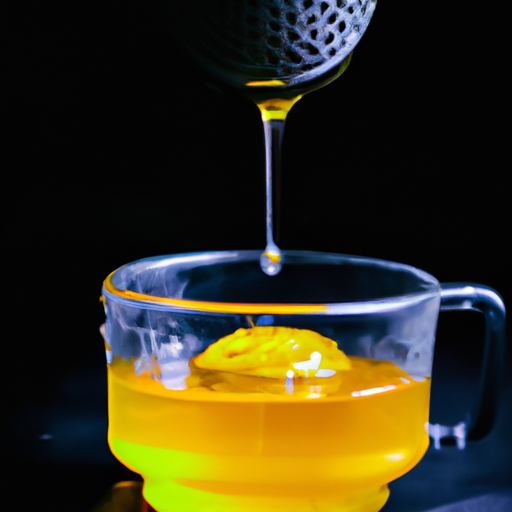Are you a fan of tea interested in changing things up? Have you heard about the numerous health benefits of turmeric tea and green tea? These teas are widely consumed globally, second only to water.
Turmeric tea, made from the root of the turmeric plant, has been used for centuries in Indian Ayurvedic medicine for its anti-inflammatory and antioxidant properties. Green tea, on the other hand, is made from the leaves of the Camellia sinensis plant and is known for its high concentration of catechins, a type of antioxidant.
Both teas have been linked to improved heart health, brain function, and digestive health. So, which one should you choose?
Let’s take a closer look at the nutritional benefits of each to help you decide.
Key Takeaways
- Both turmeric tea and green tea have numerous health benefits, including improved heart health, brain function, and digestive health.
- Turmeric tea contains curcumin, which has anti-inflammatory and antioxidant properties and can help alleviate symptoms of arthritis and other inflammatory conditions.
- Green tea contains catechins and antioxidants that can reduce the risk of heart disease and certain types of cancer, aid in weight loss, and improve memory and focus.
- The choice between turmeric tea and green tea depends on personal preference and needs, but both can provide a natural and effective way to support overall health and well-being.
What is Turmeric Tea?
If you’re looking for a warm and spicy beverage to soothe your soul, why not try sipping on a cup of Turmeric Tea? This tea is made by steeping turmeric root in hot water, and it has a long history of use in Ayurvedic and traditional Chinese medicine.
One of the main benefits of consuming turmeric tea is its anti-inflammatory properties, which can help with conditions such as arthritis and digestive issues. To make turmeric tea at home, start by boiling water and adding a few slices of fresh turmeric root. You can also add black pepper and honey for added flavor and health benefits.
Compared to other teas, turmeric tea has a unique flavor profile that is earthy, slightly bitter, and warming. It is also naturally caffeine-free, making it a great choice for those who are sensitive to caffeine.
But now, let’s move on to the next question: what’s green tea?
What is Green Tea?
You may be wondering what green tea is and how it differs from other types of tea. Green tea is made from Camellia sinensis leaves that haven’t undergone the same withering and oxidation process as black tea.
This process helps retain more of the plant’s natural antioxidants, which are believed to provide numerous health benefits. Some studies suggest that regular consumption of green tea may help reduce the risk of heart disease, certain types of cancer, and even aid in weight loss.
How is it Made?
When making turmeric tea, you’ll need to grate fresh turmeric root and simmer it in water with ginger and honey to create a warm and comforting drink that’s like a cozy hug for your insides. Unlike green tea, which is made from the leaves of the Camellia sinensis plant, turmeric tea is made from the root of the Curcuma longa plant.
This tea is known for its bright yellow color and earthy flavor, which can be enhanced with the addition of spices like cinnamon, cardamom, or black pepper. Tea brewing techniques can vary depending on personal preference, but typically involve steeping tea leaves or other ingredients in hot water for a certain amount of time to extract their flavor and nutrients.
With turmeric tea, it’s important to simmer the grated root in water for at least 10 minutes to release its beneficial compounds. Now that you know how turmeric tea is made, let’s explore what are its health benefits?
What are its Health Benefits?
The consumption of this warm, flavorful drink has been linked to a multitude of health benefits, making it a popular choice for those seeking natural remedies. Both turmeric tea and green tea have been found to aid in weight loss by boosting metabolism and burning fat.
Additionally, green tea contains compounds that can regulate blood sugar levels and prevent insulin resistance, both important factors in preventing type 2 diabetes. Turmeric contains curcumin, a powerful anti-inflammatory compound that helps alleviate symptoms of arthritis and other inflammatory conditions.
Green tea also contains antioxidants that can help reduce the risk of heart disease and certain types of cancer. Incorporating these teas into your daily routine can provide a natural and effective way to support overall health and well-being.
Moving on to the next section, let’s take a closer look at the nutritional comparison between turmeric tea and green tea.
Nutritional Comparison
If you’re looking for a hot beverage with health benefits, turmeric tea may be a better choice than green tea due to its higher levels of antioxidants and anti-inflammatory properties. Turmeric contains curcumin, a compound known for its potent antioxidant and anti-inflammatory effects. In fact, studies have shown that the antioxidant activity of curcumin is up to 10 times more powerful than that of green tea. Additionally, turmeric tea contains other beneficial nutrients, including iron, vitamin C, and fiber, making it a great addition to a healthy diet.
To give you a better idea of the nutritional differences between turmeric tea and green tea, here’s a comparison table:
| Nutrient | Turmeric Tea | Green Tea |
|---|---|---|
| Antioxidants | High levels of curcumin provide potent antioxidant activity | Contains catechins, powerful antioxidants, but in lower quantities compared to turmeric tea |
| Anti-inflammatory properties | Curcumin has strong anti-inflammatory effects | Contains some anti-inflammatory compounds, but not as potent as curcumin |
| Other nutrients | Contains iron, vitamin C, and fiber | Contains small amounts of vitamins and minerals |
As you can see, both turmeric tea and green tea have their own unique nutritional benefits. However, if you’re looking for a hot beverage with high levels of antioxidants and anti-inflammatory properties, turmeric tea may be the better choice. In the next section, we’ll explore the benefits of antioxidants in more detail.
Antioxidants
Now that you know about the nutritional comparison between turmeric tea and green tea, let’s talk about antioxidants. Antioxidants are important for your body as they protect your cells from damage caused by free radicals.
Both turmeric and green tea are top sources of antioxidants and can provide you with various health benefits. Here are three benefits that you can get from consuming turmeric tea or green tea for their antioxidants:
-
Boost your immune system: The antioxidants in both teas can help strengthen your immune system and reduce the risk of infections and diseases.
-
Improve skin health: Antioxidants can help protect your skin from damage caused by environmental factors such as pollution and UV rays. This can result in healthier-looking skin.
-
Reduce inflammation: Antioxidants can also help reduce inflammation in your body, which can lead to a variety of health problems.
Now, let’s move on to the next section and talk about the anti-inflammatory properties of turmeric and green tea.
Anti-Inflammatory Properties
To experience the anti-inflammatory benefits, you should add either turmeric tea or green tea to your daily routine. Both of these natural remedies have been used for centuries in alternative medicine to reduce inflammation in the body. Inflammation is a natural response to injury or infection, but chronic inflammation can lead to various health issues such as arthritis, heart disease, and cancer.
To understand how these teas can help reduce inflammation, let’s take a look at their active ingredients. Turmeric contains a compound called curcumin, which has been shown to have strong anti-inflammatory effects. Green tea, on the other hand, contains a catechin called epigallocatechin-3-gallate (EGCG), which has been found to reduce inflammation by inhibiting certain inflammatory markers. Here is a table that summarizes the anti-inflammatory properties of both teas:
| Turmeric Tea | Green Tea | |
|---|---|---|
| Active Ingredient | Curcumin | EGCG |
| Anti-Inflammatory Effect | Strong | Moderate |
| Other Health Benefits | Supports brain function, reduces depression and anxiety | Supports brain function, boosts metabolism, reduces risk of heart disease |
Now that you understand the anti-inflammatory properties of turmeric and green tea, let’s move on to how they can benefit your brain function.
Brain Function
You can boost your brain performance by incorporating turmeric tea or green tea into your daily routine. Both teas contain antioxidants that help protect brain cells from damage and improve cognitive function. Studies have shown that drinking green tea regularly can enhance memory and focus, as well as reduce the risk of developing Alzheimer’s and Parkinson’s disease.
On the other hand, turmeric tea contains curcumin, a powerful compound that has been found to improve mood and increase brain function. Furthermore, both turmeric tea and green tea have been found to promote healthy blood flow to the brain, which is essential for optimal cognitive function.
By improving blood flow, these teas may enhance brain performance, especially in older adults. Incorporating either of these natural remedies into your daily routine can help you maintain a sharp mind and improve cognitive function.
Moving forward, let’s explore how these teas can also benefit your heart health.
Heart Health
If you’re looking to improve your heart health, you might want to consider drinking green tea or turmeric tea. Green tea is packed with antioxidants called catechins, which can help lower your risk of heart disease.
Meanwhile, turmeric tea contains curcumin, a compound that has anti-inflammatory properties. This compound may help improve blood flow and reduce the risk of heart attack and stroke.
So, if you want to give your heart a boost, try incorporating these teas into your daily routine.
How Green Tea Improves Heart Health
By regularly drinking green tea, you can improve your heart health and decrease the risk of heart disease. How does this work? Green tea contains compounds called catechins, which are antioxidants that help prevent damage to your cells and reduce inflammation in your body.
Here are some ways green tea can improve your heart health:
- Lowers LDL cholesterol: Green tea can reduce the amount of LDL cholesterol (the ‘bad’ kind) in your blood, which can lower your risk of heart disease.
- Boosts blood vessel function: The catechins in green tea can improve the function of the cells lining your blood vessels, which helps them dilate and increases blood flow.
- Reduces blood pressure: Drinking green tea regularly can help lower your blood pressure, which is a major risk factor for heart disease.
- Enhances heart muscle function: Green tea can also improve the function of your heart muscle and reduce the risk of heart failure.
If you’re looking for ways to improve your heart health without relying solely on medication, drinking green tea regularly is a great option. Now, let’s explore how turmeric tea can also benefit your heart health.
How Turmeric Tea Improves Heart Health
When it comes to improving your heart health, turmeric tea can be a great addition to your diet. Turmeric has been found to possess anti-inflammatory properties that can reduce inflammation in the body, which is a major risk factor for heart disease.
A study conducted on heart bypass patients found that taking a turmeric supplement reduced the risk of heart attack by 56%. Turmeric also helps to improve the function of the endothelium, which is the lining of the blood vessels. This improves blood flow and reduces the risk of blood clots forming.
While green tea is also beneficial for heart health, turmeric tea can provide additional benefits. Turmeric tea can help to lower cholesterol levels, which is another major risk factor for heart disease. In a study conducted on rats, turmeric was found to reduce LDL cholesterol by 47%.
Additionally, turmeric tea can help to regulate blood sugar levels, which is important for maintaining a healthy heart. It is clear that turmeric tea can be a great addition to your diet if you want to improve your heart health.
Moving on to digestive health, it is important to note that what you eat can greatly affect the health of your digestive system.
Digestive Health
Improving your digestive health can be as simple as incorporating turmeric or green tea into your daily routine. Along with consuming probiotic supplements and fiber-rich foods, drinking a cup of turmeric tea or green tea can aid in digestion.
Turmeric contains curcumin, which has anti-inflammatory properties and can relieve digestive issues such as bloating and gas. Additionally, turmeric can stimulate bile production, which aids in fat digestion and absorption.
Green tea, on the other hand, contains catechins, which are antioxidants that can reduce inflammation and protect the digestive tract from damage. Studies have shown that green tea can improve gut health by promoting the growth of beneficial bacteria and reducing harmful bacteria. Furthermore, green tea can help regulate bowel movements and prevent constipation.
Now that you know how both turmeric and green tea can improve your digestive health, it’s important to consider which tea is right for you. In the next section, we’ll explore the differences between turmeric tea and green tea to help you make an informed decision.
Which Tea is Right for You?
Deciding which brew suits your taste buds and digestive needs can be tough to crack, but fear not, we’ve got you covered with a side-by-side comparison.
Let’s start with the taste comparison. Turmeric tea has a unique earthy and slightly bitter taste, while green tea has a grassy and slightly sweet taste. If you’re a fan of spicy and bold flavors, turmeric tea might be the right choice for you. On the other hand, if you prefer a lighter and refreshing taste, green tea might be the one to go for.
Moving on to the caffeine content debate, green tea contains more caffeine than turmeric tea. A cup of green tea has about 25-45 mg of caffeine, while turmeric tea has almost no caffeine at all. If you’re sensitive to caffeine or looking for a caffeine-free option, turmeric tea might be your best bet. However, if you need a little boost of energy to start your day, green tea might be the way to go.
Ultimately, the choice between turmeric tea and green tea depends on your personal preference and needs.
Frequently Asked Questions
Can turmeric tea and green tea be consumed together?
Combining the benefits of turmeric and green tea is possible, but the taste comparison may not be to your liking. Both teas have their own unique taste and health benefits. Experiment and find what works for you.
How much turmeric or green tea should be consumed daily for maximum health benefits?
To reap optimal health benefits, it is recommended to consume 3-4 cups of green tea or 1-2 teaspoons of turmeric daily. However, it’s important to consult a healthcare professional before making significant dietary changes.
Are there any potential side effects or risks associated with drinking turmeric or green tea?
When it comes to drinking turmeric or green tea, there are potential side effects to consider. Both teas can cause stomach upset and turmeric may interact with certain medications. However, with proper brewing tips, both teas offer unique flavor profiles to compare.
Can turmeric or green tea help with weight loss?
Did you know that over 2 billion people worldwide are overweight or obese? When it comes to weight loss, studies show that green tea may be more effective than turmeric tea. However, both can aid in weight management when combined with a healthy diet and exercise.
Are there any contraindications for consuming turmeric or green tea with certain medications or medical conditions?
Before consuming any medication or supplement, it is important to discuss potential interactions and medical contraindications with your healthcare provider. Both turmeric tea and green tea have health benefits and potential risks, and dosage recommendations can vary. It is also important to note that while they may aid in weight loss efforts, they should not be used as a substitute for a healthy diet and exercise routine. Additionally, turmeric tea may interact with certain medications, such as blood thinners, and should be used with caution. Green tea may also interact with some medications, such as those for anxiety and high blood pressure, and should be used in moderation. While both teas contain beneficial nutrients, it is important to consider individual medical history and medication use before incorporating them into your diet.
Conclusion
So, which tea is right for you? It ultimately depends on your personal health goals and preferences. Turmeric tea boasts impressive anti-inflammatory properties and may aid in digestion, while green tea is packed with antioxidants and has been linked to improved brain function and heart health.
Both teas have their own unique benefits, making it difficult to choose just one. Like a leaf in the wind, let your body guide you in choosing the tea that will best suit your needs.
Whichever you choose, sipping on a warm cup of tea can be a comforting and nourishing way to care for yourself. So go ahead, indulge in a cup of turmeric or green tea and let its healing powers wash over you like a gentle wave.










